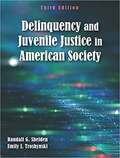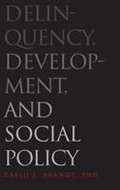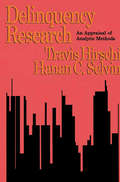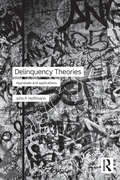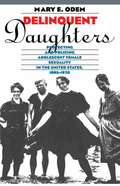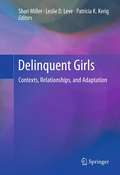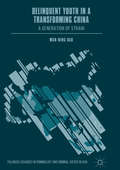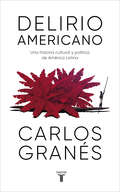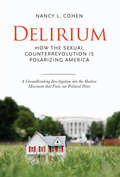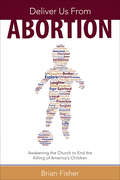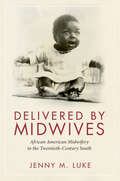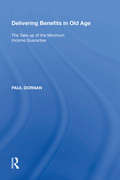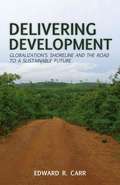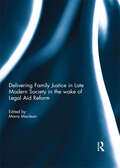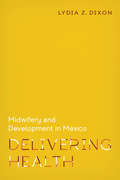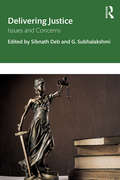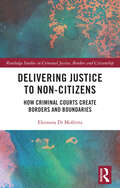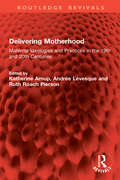- Table View
- List View
Delinquency And Juvenile Justice In American Society
by Randall G. Shelden Emily I. TroshynskiWhat is delinquency? What are the pathways to offending? What prevention strategies exist? To understand delinquency, we need to overcome stereotypical thinking and implicit biases. This engaging, affordable text explores the impact of gendered, racial, and class attitudes on decisions to arrest, detain, adjudicate, and place youths in the juvenile justice system. Shelden and Troshynski highlight the social, legal, and political influences on how the public perceives juveniles. They look at the influences of family and schools on delinquency, as well as the impact of gender, trauma, and mental health issues. Discussions of topics such as the school-to-prison pipeline, disproportionate minority contact, and inequality provide a nuanced perspective on delinquency—a critical examination of social policies intended to control delinquency and the populations most likely to enter the juvenile justice system. The authors also examine the dramatically declining juvenile crime rate and advances in neuroscience that have fostered substantive reforms. These alternatives to confinement are replacing the institutions that have repeatedly produced failure with rehabilitative programs that offer hope for a more promising future.
Delinquency and Substance Use in Europe: Understanding Risk and Protective Factors
by David P. Farrington Harrie Jonkman Frederick Groeger-RothThis book examines the use of “Communities That Care” (CTC) interventions in European countries. It reports results obtained by using the CTC Youth Survey in five European countries covering different parts of Europe – Great Britain, the Netherlands, Germany, Croatia, and Cyprus. The main aim of the book is to compare (a) the prevalence of delinquency and substance use, (b) the prevalence of key risk and protective factors, and (c) the strength of relationships between risk and protective factors and delinquency and substance use, in these five European countries. The chapters in this book compare similarities and differences between the countries, possible explanations of these, and the implications of the results for theories and for intervention policy and practice. Additionally, it provides evidence about the replicability over time and place of the strength of relationships between (i) risk and protective factors and (ii) delinquency and substance use. In turn, this increases confidence in the generalizability of criminological theories over time and place. It will be of interest to researchers and practitioners in criminology and criminal justice, particularly those with an interest in developmental and life-course criminology, juvenile delinquency, and substance use, as well as crime prevention and intervention.
Delinquency, Development, and Social Policy
by David E. BrandtDavid E. Brandt examines the legal, psychological, and cultural issues relevant to understanding antisocial behavior in adolescence. Based on his own research and a broad analysis of recent work in the field, Brandt identifies the factors that are common in cases of delinquency. The discussion considers the long-term effects of social issues such as poverty as well as psychological issues such as the high levels of stress and anxiety suffered during childhood by many delinquents. He shows how a failure to meet the developmental needs of children--at both the family level and at a broader social and political level--is at the core of the problem of juvenile delinquency. Brandt concludes with an inquiry into how best to prevent delinquency. Programs that address the developmental needs of children, Brandt argues, are more effective than policing, juvenile courts, or incarceration.
Delinquency Research: An Appraisal of Analytic Methods
by Travis Hirschi Hanan C. SelvinThis remarkable guide to delinquency studies was co-winner of the 1968 C. Wright Mills Award for the best book in the field of social problems. The work is in effect three books in one: a forthright account of how to analyze survey data, a penetrating critique of delinquency research, and a set of original essays on methodology. It is a landmark work that continues to serve as an essential tool for those who both study and want to learn about deviance. In the new introduction, Travis Hirschi describes the setting in which 'Delinquency Research' was written, noting that it exudes a confident optimism that well-conducted research and analysis will quickly lead to important advances in the field. Hirschi maintains that twenty-eight years after 'Delinquency Research' was first published the validity of its optimistic view has been confirmed by the fact that the field of criminology is among the leading producers of high quality research. As a result, we know more about crime and delinquency than ever before. 'Delinquency Research' forms the basis for present and future studies of criminology and is a necessary addition to the libraries of sociologists, criminologists, scholars in the area of delinquency, and students interested in research methods.
Delinquency Theories: Appraisals and applications
by John P. HoffmannDelinquency Theories: Appraisals and applications provides a fulsome and accessible overview of contemporary theories of juvenile delinquency. The book opens with a comprehensive description of what a theory is, and explains how theories are created in the social sciences. Following on, each subsequent chapter is dedicated to describing an individual theory, broken down and illustrated within four distinct sections. Initially, each chapter tells the tale of a delinquent youth, and from this example a thorough review of the particular theory and related research can be undertaken to explain the youth’s delinquent behaviour. The third and fourth sections of each chapter critically analyze the theories, and provide a straightforward discussion of policy implications of each, thus encouraging readers to evaluate the usefulness of these theories and also to consider the relationship between theory and policy. This text is an invaluable resource for both undergraduate and graduate students of subjects such as youth justice, delinquency, social theory, and criminology.
Delinquent Daughters: Protecting and Policing Adolescent Female Sexuality in the United States, 1885-1920
by Mary E. OdemDelinquent Daughters explores the gender, class, and racial tensions that fueled campaigns to control female sexuality in late nineteenth- and early twentieth-century America. Mary Odem looks at these moral reform movements from a national perspective, explores the local enforcement of regulatory legislation in Alameda and Los Angeles Counties in California and shows that the paradoxical consequences of reform often resulted in coercive and discriminatory policies toward working-class girls.
Delinquent Girls
by Leslie D. Leve Shari Miller Patricia K. KerigTraditionally, delinquent girls were considered an anomaly, a rare phenomenon attracting little scholarly notice. Today, more than one in four youth offenders is female, and researchers and practitioners alike are quickly turning their attention and resources to address this challenging situation. Delinquent Girls: Contexts, Relationships, and Adaptation synthesizes what is known about girls involved in delinquent behavior and their experiences at different points in the juvenile justice system. This breakthrough volume adds to the understanding of this population by offering empirical analysis not only of how these behaviors develop but also about what is being done to intervene. Employing multiple theoretical models, qualitative and quantitative data sources, law enforcement records, and insights across disciplines, leading scholars review causes and correlates; the roles of family and peers; psychological and legal issues; policy changes resulting in more arrests of young women; and evidence-based prevention and intervention strategies. Each chapter covers its subject in depth, providing theory, findings, and future directions. Important topics addressed include: Narrowing the gender gap - trends in girls' delinquency.Girls at the intersection of juvenile justice, criminal justice, and child welfare.Trauma exposure, mental health issues, and girls' delinquency.Beyond the stereotypes: girls in gangs.Intervention programs for at-risk and court-involved girls.Implications for practice and policy.With its broad scope and solution-oriented focus, Delinquent Girls: Contexts, Relationships, and Adaptation is a must-have volume for researchers, professionals, graduate students, and social policy experts in clinical child and school psychology, social work, juvenile justice, criminology, developmental psychology, and sociology.
The Delinquent Solution: A Study in Subcultural Theory (Routledge Revivals)
by David DownesFirst published in 1966, The Delinquent Solution presents a study of crime associated with the nature of subcultures. The book discusses issues such as the concept and theory of subcultures, the life of delinquent gangs, and the English experience of delinquent subcultures. It also takes an in-depth look at the Stepney and Poplar survey on crime from 1960, analysing both statistical data and more informal observations. Although the book was written over forty years ago, the issues discussed remain relevant and strong areas of interest.
Delinquent Youth in a Transforming China
by Wan-Ning BaoThis book explores two major social problems facing Chinese society today: increased strain in the lives of young people and heightened rates of crime and delinquency, ultimately examining the links between them. More broadly, it draws on Bronfenbrenner's ecological systems theory and Agnew's general strain theory to examine the factors and processes affecting young people, leading to life strain and delinquency. It represents the first study of this kind and involves the most systematic and comprehensive literature review of studies on major social, economic, political and cultural changes, as well as youth crime in contemporary China. Bao's arguments are supported by empirical evidence including data findings and over a decade's worth of observational research. Shedding new light on the nature of youth crime in a rapidly changing society, this methodical study will benefit policy makers and researchers, helping them to develop tactics and methods to reduce strain in the lives of young people, and thus effectively prevent delinquency in China.
Delinquents and Debutantes: Twentieth-Century American Girls' Cultures
by Sherrie A. InnessThe contributors, including such leading scholars as Vicki L. Ruiz, Jennifer Scanlon, and Miriam Formanek-Brunell, examine myriad ways in which a variety of discourses and activities from popular girls' magazines and advertisements to babysitting and the Girl Scouts help form girls' experiences of what it means to be a girl, and later a woman, in our society. The essays address such topics as board games and the socialization of adolescent girls, dolls and political ideologies, Nancy Drew and the Filipina American experience, the queering of girls' detective fiction, and female juvenile delinquency to demonstrate how cultural discourses shape both the young and teenage girl in America. Although girls' culture has until now received comparatively little attention from scholars, this work confirms that understanding the culture of girls is essential to understanding how gender works in our society. Making a significant contribution to a long-neglected area of social and cultural inquiry, Delinquents and Debutantes will be of central interest to those in women's studies, American studies, history, literature, and cultural studies.
Delirio americano: Una historia cultural y política de América Latina
by Carlos GranésDisfruten con la fantasía de los creadores latinoamericanos y observen las nefastas consecuencias del ensueño de los políticos. Y cómo a veces ambos delirios fueron de la mano. Carlos Granés, uno de los pensadores más sólidos y originales de la actualidad, recompone con gran pulso narrativo el inmenso, intrincado y exuberante puzle del largo siglo XX en América Latina. Por primera vez, los lectores pueden recorrer en un mismo relato las etapas, fuerzas y acontecimientos de una historia tradicionalmente contada de manera fragmentaria y profundamente marcada por las complejas relaciones entre cultura y política. El ensayo traza conexiones sorprendentes, muestra reveladoras contradicciones y retrata a figuras como José Martí, César Vallejo, Nahui Olín, Juan Domingo Perón, García Márquez, Doris Salcedo o Caetano Veloso. Desde las primeras reivindicaciones de una América Latina con identidad propia por parte de poetas y ensayistas, el surgimiento del comunismo y el fascismo latinoamericano y la irrupción del populismo hasta la resaca del boom, las nuevas tensiones entre lo local y lo global y la muerte de Fidel Castro en 2016, el libro rastrea el papel de las ideas y las artes en la invención de América Latina y en la construcción de las identidades nacionales durante las dictaduras y revoluciones. Granés da cuenta con brillantez de la influencia del surrealismo, cuyo impacto decisivo fue también político, pues dio lugar a una alternativa individualista, libertaria e imaginativa a las ideologías totalitarias y al populismo que derivaría en la izquierda heterodoxa y en el liberalismo. Delirio americano es un maravilloso fresco, admirablemente narrado, que amplía nuestra mirada sobre un continente cuya historia y destino afectan a las prácticas políticas y culturales de todo Occidente. La crítica ha dicho... «Carlos Granés es en mi opinión uno de los mejores ensayistas de nuestra lengua. Sus libros están escritos en una prosa precisa y flexible, prodigan ideas frescas y son capaces de abrir perspectivas nuevas sobre viejos problemas.» JAVIER CERCAS «Granés es uno de los mejores ensayistas actuales, un escritor brillante y perspicaz».El Confidencial «No creo que nadie haya trazado un fresco tan completo, animado y lúcido sobre todas las vanguardias artísticas del siglo XX. Lo he leído con la felicidad y la excitación con que leo las mejores novelas».Mario Vargas Llosa, sobre El puño invisible «Granés vuelve a dar en el clavo con un ensayo capaz de captar la atención del lector sobre un tema de actualidad y enorme alcance».Forbes, sobre Salvajes de una nueva época «Ameno y riguroso ensayo sobre la liaison de la cultura, el capitalismo y la política».ABC, sobre Salvajes de una nueva época «La política se vuelve vocinglera y el capitalismo vira a lo correcto. Este ensayo pone en limpio lo que parece inconexo».El Mundo, sobre Salvajes de una nueva época
Delirio --The Fantastic, the Demonic, and the Réel: The Buried History of Nuevo León
by Marie Theresa HernándezStriking, inexplicable stories circulate among the people of Nuevo León in northern Mexico. Stories of conversos (converted Jews) who fled the Inquisition in Spain and became fabulously wealthy in Mexico. Stories of women and children buried in walls and under houses. Stories of an entire, secret city hidden under modern-day Monterrey. All these stories have no place or corroboration in the official histories of Nuevo León. In this pioneering ethnography, Marie Theresa Hernández explores how the folktales of Nuevo León encode aspects of Nuevolenese identity that have been lost, repressed, or fetishized in "legitimate" histories of the region. She focuses particularly on stories regarding three groups: the Sephardic Jews said to be the "original" settlers of the region, the "disappeared" indigenous population, and the supposed "barbaric" society that persists in modern Nuevo León. Hernández's explorations into these stories uncover the region's complicated history, as well as the problematic and often fascinating relationship between history and folklore, between officially accepted "facts" and "fictions" that many Nuevoleneses believe as truth.
Delirium: The Politics of Sex in America
by Nancy L. Cohen"Perhaps if the Pill had never been invented, American politics would be very different today," Nancy L. Cohen writes in her prescient new book, Delirium: The Politics of Sex in AmericaThe 2012 election was supposed to be about the economy, but over the last few months it turned into a debate about sex and women's rights. In Delirium, Cohen takes us on a gripping journey through the confounding and mysterious episodes of our recent politics to explain how we and why we got to this place. Along the way she explores such topics as why Bill Clinton was impeached over a private sexual affair; how George W. Bush won the presidency by stealth; why Hillary lost to Obama; why John McCain chose Sarah Palin to be his running mate; and what the 2012 presidential contest tells us about America today. She exposes the surprising role of right–wing women in undermining women's rights, as well as explains how liberal men were complicit in letting it happen. Cohen uncovers the hidden history of an orchestrated, well–financed, ideologically powered shadow movement to turn back the clock on matters of gender equality and sexual freedom and how it has played a leading role in fueling America's political wars. Delirium tells the story of this shadow movement and how we can restore common sense and sanity in our nation's politics.
Deliver Me from Pain: Anesthesia and Birth in America
by Jacqueline H. WolfDespite today's historically low maternal and infant mortality rates in the United States, labor continues to evoke fear among American women. Rather than embrace the natural childbirth methods promoted in the 1970s, most women welcome epidural anesthesia and even Cesarean deliveries. In Deliver Me from Pain, Jacqueline H. Wolf asks how a treatment such as obstetric anesthesia, even when it historically posed serious risk to mothers and newborns, paradoxically came to assuage women's anxiety about birth.Each chapter begins with the story of a birth, dramatically illustrating the unique practices of the era being examined. Deliver Me from Pain covers the development and use of anesthesia from ether and chloroform in the mid-nineteenth century; to amnesiacs, barbiturates, narcotics, opioids, tranquilizers, saddle blocks, spinals, and gas during the mid-twentieth century; to epidural anesthesia today.Labor pain is not merely a physiological response, but a phenomenon that mothers and physicians perceive through a historical, social, and cultural lens. Wolf examines these influences and argues that medical and lay views of labor pain and the concomitant acceptance of obstetric anesthesia have had a ripple effect, creating the conditions for acceptance of other, often unnecessary, and sometimes risky obstetric treatments: forceps, the chemical induction and augmentation of labor, episiotomy, electronic fetal monitoring, and Cesarean section.As American women make decisions about anesthesia today, Deliver Me from Pain offers them insight into how women made this choice in the past and why each generation of mothers has made dramatically different decisions.
Deliver Us From Abortion: Awakening the Church to End the Killing of America's Children
by Brian FisherThe author of Abortion: The Ultimate Exploitation of Women offers a blueprint for the American Church to handle abortion in our country.Consider that for the past forty years, a staggering fifty-six million Americans have been killed by abortion. It claims the lives of over 1.2 million children every year, or roughly one child every twenty-five seconds. So why isn’t the American church doing something to stop this atrocity, which is the greatest holocaust in American history? The majority of American churches, God’s institutions for spreading the gospel of peace and defending the weak and innocent, remain silent. Feeding the poor, stopping human trafficking, rescuing children from abuse, and protecting women from exploitation are all issues the church is addressing. Yet abortion remains eerily absent from the list of church priorities in America. Why isn’t it the church’s highest priority? Is the American church silent because abortion has become politicized and church leaders are afraid to discuss it or because we simply don’t know what the Bible says about it? What will cause the church to wake up, rise up and take this issue to task to save our children?In his latest book, Deliver Us From Abortion, Brian Fisher, co-founder and president of Online for Life, breaks the veil of silence and uncovers the reality of abortion in the church, what the Bible really says about it, and how God has empowered His church to end this unspeakable tragedy.Praise for Deliver Us from Abortion“This book provides a powerful defense for the children who can’t speak for themselves.” —Josh McDowell, bestselling author of 138 books including More Than a Carpenter“Abortion is the greatest moral crisis of our generation, yet far too many churches have remained silent. In Deliver Us From Abortion, Brian Fisher offers a blueprint for the American church that is both instructive and encouraging. I pray that we can all hear and accept his challenge.” —Dr. Tony Evans, president, The Urban Alternative, senior pastor, Oak Cliff Bible Fellowship“Growing up in the King family during the Civil Rights era, I know what the church can accomplish. I am so glad Brian has written this book. May it challenge and equip the church to end the abortion holocaust in America.” —Dr. Alveda King, director of African-American outreach, Priests for Life
Delivered by Midwives: African American Midwifery in the Twentieth-Century South
by Jenny M. LukeWinner of the 2019 American Association for the History of Nursing Lavinia L. Dock Award for Exemplary Historical Research and Writing in a Book“Catchin’ babies” was merely one aspect of the broad role of African American midwives in the twentieth-century South. Yet, little has been written about the type of care they provided or how midwifery and maternity care evolved under the increasing presence of local and federal health care structures.Using evidence from nursing, medical, and public health journals of the era; primary sources from state and county departments of health; and personal accounts from varied practitioners, Delivered by Midwives: African American Midwifery in the Twentieth-Century South provides a new perspective on the childbirth experience of African American women and their maternity care providers. Author Jenny M. Luke moves beyond the usual racial dichotomies to expose a more complex shift in childbirth culture, revealing the changing expectations and agency of African American women in their rejection of a two-tier maternity care system and their demands to be part of an inclusive, desegregated society.Moreover, Luke illuminates valuable aspects of a maternity care model previously discarded in the name of progress. High maternal and infant mortality rates led to the passage of the Sheppard-Towner Maternity and Infancy Protection Act in 1921. This marked the first attempt by the federal government to improve the welfare of mothers and babies. Almost a century later, concern about maternal mortality and persistent racial disparities have forced a reassessment. Elements of the long-abandoned care model are being reincorporated into modern practice, answering current health care dilemmas by heeding lessons from the past.
Delivering Benefits in Old Age: The Take up of the Minimum Income Guarantee (Studies In Cash And Care Ser.)
by Paul DornanAlthough means-testing for Social Security transfers is economical, it hasn't proven to be very effective. The Minimum Income Guarantee (MIG) and the Pension Credit initiatives implemented by the Labour Government in the UK have both suffered from low levels of take up amongst entitled pensioners. This book sheds important new light on this pressing problem, examining existing research on take-up and highlighting gaps in understanding. It explores the strengths and weaknesses of the theoretical base, drawing on European theory and applying it to the UK. Socio-economic, demographic and attitudinal trends are analyzed to elucidate the impact they have had, and will have, on the proportion entitled to MIG and its take-up rate. Current policy is also analyzed to explore the importance of take-up for the Labour government and the prospects of improving it. As high take-up would be an important step in combating poverty, this book offers solutions and options to tackle these problems. It is therefore of critical interest to academics and policy makers in the UK and around the world.
Delivering Development: Globalization’s Shoreline and the Road to a Sustainable Future
by Edward R. CarrIn Delivering Development, author Edward Carr calls into question the very universal, unquestioned assumptions about globalization, development, and environmental change that undergird much of development and economic policy. Here he demonstrates how commonly held beliefs about globalization and development have failed the global poor. Over his 13 years of working along what he calls "globalization's shoreline," a world region buffeted by the economic, political, and environmental decisions of those living in wealthier places, Carr has concluded that most experts misunderstand what they are trying to fix, and cannot tell if they are fixing it. Delivering Development is an eye opening, you-are-there book that compels the reader to question conventional wisdom, redefines what assistance to the developing world really means, and explores alternative ways of achieving meaningful, enduring improvements to human well-being.
Delivering Family Justice in Late Modern Society in the wake of Legal Aid Reform
by Mavis MacleanLegal aid for family cases in private law, mainly divorce and separation, where the state is not directly involved as it is in public law cases where there are issues of domestic violence or neglect or abuse of children, came to an abrupt end together with help for welfare and immigration cases on April 1 2013 when the Legal Aid Sentencing and Punishment of Offenders Act (LASPO) came into effect. This book presents an account of the wide ranging problems which the researchers and practitioners expected to ensue. Sadly, their fears have been realised in many areas of legal help and advice. The National Audit Office was to take the view in 2014 that although the Ministry of Justice had succeeded in making considerable savings in the cause of austerity that they had failed to investigate or understand the impact of these cuts on the individuals concerned and society as a whole. This book was previously published as a special issue of the Journal of Social Welfare and Family Law.
Delivering Health: Midwifery and Development in Mexico (Policy to Practice)
by Lydia Z. DixonMaternal health outcomes are a key focus of global health initiatives. In Delivering Health, author Lydia Z. Dixon uncovers the ways such outcomes have been shaped by broader historical, political, and social factors in Mexico, through the perspectives of those who are at the front lines fighting for change: midwives. Midwives have long been marginalized in Mexico as remnants of the country's precolonial past, yet Dixon shows how they are now strategically positioning themselves as agents of modernity and development. Midwifery education programs have popped up across Mexico, each with their own critique of the health care system and vision for how midwifery can help. Delivering Health ethnographically examines three such schools with very different educational approaches and professional goals. From San Miguel de Allende to Oaxaca to Michoacán and points between, Dixon takes us into the classrooms, clinics, and conferences where questions of what it means to provide good reproductive health care are being taught, challenged, and implemented. Through interviews, observational data, and even student artwork, we are shown how underlying inequality manifests in poor care for many Mexican women. The midwives in this book argue that they can improve care while also addressing this inequality. Ultimately, Delivering Health asks us to consider the possibility that marginalized actors like midwives may hold the solution to widespread concerns in health.
Delivering Home-Based Services: A Social Work Perspective
by Susan F. Allen Elizabeth M. Tracy Eds.Service providers are increasingly called upon to serve clients at home, a setting even a seasoned professional can find difficult to negotiate. From monitoring the health of older populations to managing paroled offenders, preventing child abuse, and reunifying families, home-based services require models that ensure positive outcomes and address the ethical dilemmas that might arise in such sensitive contexts.The contributors to this volume are national experts in diverse fields of social work practice, policy, and research. Treating the home as an ecological setting that guides human development and family interaction, they present rationales for and overviews of evidence-based models across an array of populations and fields of practice. Part 1 provides historical background and contemporary applications for home-based services, highlighting ethical, administrative, and supervision issues and summarizing the social policies that shape service delivery. Part 2 addresses home-based practice in such fields as child and adult mental health, school social work, and hospice care, detailing the particular population being treated, the policy and agency context, theories and empirical data, and practice guidelines. Part 3, the editors present a unifying framework and suggest future directions for home-based social work.
Delivering Home-Based Services: A Social Work Perspective
by Elizabeth M. Tracy Susan F. AllenService providers are increasingly called upon to serve clients at home, a setting even a seasoned professional can find difficult to negotiate. From monitoring the health of older populations to managing paroled offenders, preventing child abuse, and reunifying families, home-based services require models that ensure positive outcomes and address the ethical dilemmas that might arise in such sensitive contexts. The contributors to this volume are national experts in diverse fields of social work practice, policy, and research. Treating the home as an ecological setting that guides human development and family interaction, they present rationales for and overviews of evidence-based models across an array of populations and fields of practice. Part 1 provides historical background and contemporary applications for home-based services, highlighting ethical, administrative, and supervision issues and summarizing the social policies that shape service delivery. Part 2 addresses home-based practice in such fields as child and adult mental health, school social work, and hospice care, detailing the particular population being treated, the policy and agency context, theories and empirical data, and practice guidelines. Part 3, the editors present a unifying framework and suggest future directions for home-based social work.
Delivering Justice: Issues and Concerns
by Sibnath Deb; G. SubhalakshmiThis book critically analyzes emerging issues and challenges in delivering timely justice to common people. It brings a wide range of contemporary and relevant issues relating to the gross violation of human rights and presents situation-based evidence from, and first-hand experiences of, behavioral, social and legal professionals. It deals with themes such as holding administrations accountable and securing justice, challenges for the judiciary in the early disposal of cases, challenges to the forensic community, green federalism and environmental justice, current threats to human rights, ethics in the criminal justice system and honor killing from socio-cultural perspectives. Topical and comprehensive, this book will be an excellent read for scholars and researchers of political studies, legal studies, human rights, psychology, behavioural studies, political sociology, sociology, development studies, governance and public policy, environmental studies and South Asian studies. It will also interest policymakers, nongovernmental organizations, activists and professionals in the field.
Delivering Justice to Non-Citizens: How Criminal Courts Create Borders and Boundaries (Routledge Studies in Criminal Justice, Borders and Citizenship)
by Eleonora Di MolfettaHow does justice for non-citizens look like? This book provides a nuanced cross-section of how criminal courts deliver justice to non-citizens, investigating rationales and purposes of penal power directed at foreign defendants. It examines how lack of citizenship alters the contours of justice, creating a different system oriented at control and exclusion of non-members. Drawing on ethnographic research in an Italian criminal court, the book details how citizenship and national belonging not only matter, but are matters reproduced, elaborated, and negotiated throughout the judicial process, exploring the implications of this development for the understanding of penal power and the role of criminal courts.Set in the context of the growing intersection between migration control and penal power, Delivering Justice to Non-Citizens explores whether and how instances of border control have seeped into judicial practices. In doing so, it fills a significant gap in the scholarship on border criminology by considering a rather unexplored actor in the field of migration studies: criminal courts. Based on a year of courtroom ethnography in Turin, Delivering Justice to Non-Citizens relies on interviews with courtroom actors, courthouse observations, analysis of court files, together with local media analysis, to provide a vivid image of judicial practices towards foreign defendants in a medium-size criminal court. It considers and balances the distinctive traits of the local context with ongoing global processes and transformations and adds much needed insights into how global processes impact local realities and how the local, in turn, adjusts to global challenges. Through instances of everyday justice, the book calls attention to how migration control has silently seeped into the judicial realm.The book will be of interest to students and academics in sociology, criminology, law, penology, and migration studies. It will also be an important reading for legal practitioners, magistrates, and other law enforcement authorities.
Delivering Motherhood: Maternal Ideologies and Practices in the 19th and 20th Centuries (Routledge Revivals)
by Katherine Arnup Andrée Lévesque Ruth Roach PiersonIn the course of the nineteenth and twentieth centuries, motherhood in Canada, as elsewhere in the western world, became contested terrain. Male medical practitioners vied with midwives, and midwives with nurses, while reform-minded middle-class women joined with the eugenically minded state officials in efforts to control the quantity and quality of the population. As reproduction gained in importance as a political as well as a religious issue, motherhood became the centre of debate over public health and welfare policies and formed the cornerstone of feminist and anti-feminist, as well as nationalist and pacifist ideologies.Originally published in 1990, Delivering Motherhood (now with a new preface by Katherine Arnup) is the first comprehensive study on the history of this complex development in Canada, where control over the different stages of reproduction, from conception, to delivery, to childcare, shifted from the central figure of the mother to experts and professionals. The contributions range from the treatment of single mothers in Montreal in the Depression to La Leche League in the 1960s, 70s, and 80s.This book will be an essential read for students and researchers of women’s studies, feminist studies, women’s history, and sociology.
